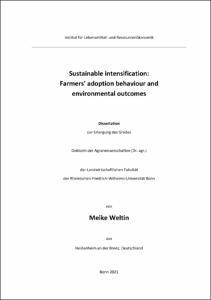Weltin, Meike: Sustainable intensification: Farmers’ adoption behaviour and environmental outcomes. - Bonn, 2021. - Dissertation, Rheinische Friedrich-Wilhelms-Universität Bonn.
Online-Ausgabe in bonndoc: https://nbn-resolving.org/urn:nbn:de:hbz:5-61643
Online-Ausgabe in bonndoc: https://nbn-resolving.org/urn:nbn:de:hbz:5-61643
@phdthesis{handle:20.500.11811/9023,
urn: https://nbn-resolving.org/urn:nbn:de:hbz:5-61643,
author = {{Meike Weltin}},
title = {Sustainable intensification: Farmers’ adoption behaviour and environmental outcomes},
school = {Rheinische Friedrich-Wilhelms-Universität Bonn},
year = 2021,
month = apr,
note = {Sustainable intensification measures imply implementing changes in farming systems to improve environmental outcomes without compromising economic outputs. In order to assess the achievement of these outcomes, the dissertation at hand investigates the role of farmers’ decision-making with respect to the effective implementation of sustainable intensification measures. The dissertation consists of three empirical studies, each dealing with one aspect of the decision process.
The first study focuses on sustainable intensification measures as the decision objects. A systematic literature review of 349 scientific publications builds the basis to develop a conceptual model of sustainable intensification, where four fields of action structure the portfolio of sustainable intensification measures. This conceptual model allows particularising local priority measures and regional measure portfolios in focus group discussions with stakeholders. The second study analyses farmers’ decision rationales for these regional portfolios. An explorative approach based on multivariate probit and path modelling links farmers’ positive experience with their sustainable intensification measures used to their intentions to broaden the portfolios with additional measures. Several complementary relationships in the use of sustainable intensification measures are established. The second and third study rest on farm survey data from the northern German Plain collected in 2017. The third study links adoption behaviour and decision outcomes by analysing eco-efficiency gains achieved by using agronomic sustainable intensification measures based on a theoretical model. Eco-efficiency is measured as the distance of current farm production to the production possibility frontier in the direction of the environmental outcome. Adopters show higher average eco-efficiency scores than a control group of matched non-adopters and determine a meta-frontier. However, most adopters do not fully exploit the ecological improvement potential of their farm.
This dissertation shows the capacities of sustainable intensification measures for on-farm environmental improvement. The capacity for improvement depends on farmers’ decisions on how effectively they apply sustainable intensification measures. Political intervention schemes and future research to support effective implementation and full exploitation of improvement potentials are discussed.},
url = {https://hdl.handle.net/20.500.11811/9023}
}
urn: https://nbn-resolving.org/urn:nbn:de:hbz:5-61643,
author = {{Meike Weltin}},
title = {Sustainable intensification: Farmers’ adoption behaviour and environmental outcomes},
school = {Rheinische Friedrich-Wilhelms-Universität Bonn},
year = 2021,
month = apr,
note = {Sustainable intensification measures imply implementing changes in farming systems to improve environmental outcomes without compromising economic outputs. In order to assess the achievement of these outcomes, the dissertation at hand investigates the role of farmers’ decision-making with respect to the effective implementation of sustainable intensification measures. The dissertation consists of three empirical studies, each dealing with one aspect of the decision process.
The first study focuses on sustainable intensification measures as the decision objects. A systematic literature review of 349 scientific publications builds the basis to develop a conceptual model of sustainable intensification, where four fields of action structure the portfolio of sustainable intensification measures. This conceptual model allows particularising local priority measures and regional measure portfolios in focus group discussions with stakeholders. The second study analyses farmers’ decision rationales for these regional portfolios. An explorative approach based on multivariate probit and path modelling links farmers’ positive experience with their sustainable intensification measures used to their intentions to broaden the portfolios with additional measures. Several complementary relationships in the use of sustainable intensification measures are established. The second and third study rest on farm survey data from the northern German Plain collected in 2017. The third study links adoption behaviour and decision outcomes by analysing eco-efficiency gains achieved by using agronomic sustainable intensification measures based on a theoretical model. Eco-efficiency is measured as the distance of current farm production to the production possibility frontier in the direction of the environmental outcome. Adopters show higher average eco-efficiency scores than a control group of matched non-adopters and determine a meta-frontier. However, most adopters do not fully exploit the ecological improvement potential of their farm.
This dissertation shows the capacities of sustainable intensification measures for on-farm environmental improvement. The capacity for improvement depends on farmers’ decisions on how effectively they apply sustainable intensification measures. Political intervention schemes and future research to support effective implementation and full exploitation of improvement potentials are discussed.},
url = {https://hdl.handle.net/20.500.11811/9023}
}






